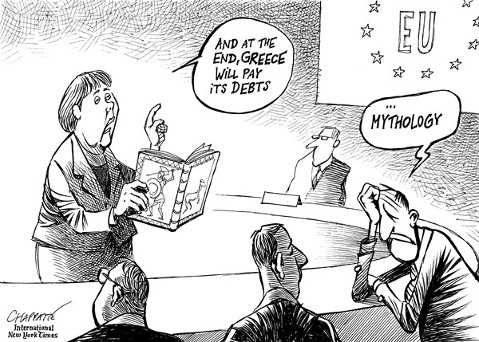The Wolf at Greece’s Door
As the Barbarian Tourists Depart, Country Faces Its Debt Problem Once Again

I didn’t go to the Greek Festival this year for a number of reasons, not the least of which was a strange but no doubt untoward reaction to one of the ads for the thing which encouraged attendance so one could “Feel like a Greek” for a day.
I have lived in Greece for many years and know it better than I know Santa Barbara. I have known Greeks from barmen to mayors, to shipping magnates, priests, and a couple of clowns and a communist from Thessaloniki beneath the summit of Olympus in a German refuge over ouzo and stew. I have been to weddings and funerals, christenings and riots. I have drunk long and deep with veterans from both sides of the Civil War. I climbed Mt. Olympus five times and watched the fog obscure us from the mortals down in the Aegean and the motorists on the National Road on their way to visit the unsightly village of Drama or Thermopylae — the “hot gates’ where the Greeks and the Persians slaughtered each other and where the Marathon got its name. I have fished for octopi by moonlight, bribed bankers and bus companies while hiding my tax burden under loads of obfuscation and misdirection.
I have known its gut-punch beauty blocks from desperate bordellos and immigrant hideouts in Piraeus and Patras. I have seen the sun rise over every sea in Greece, been to the Parthenon 80 or so times, visited the cave where Zeus was born on Naxos, and bought coins on the black market with the head of Alexander the Great emblazoned like a raised middle finger at all the history that had come before him. I have drank wine at Delphi where the Oracles, stoned and enigmatic, wavered and quaked as they spun their enigmas. I have been to Delos, a Sacred Island, where no one has slept for a thousand years.
I have not, however, ever “felt like a Greek.” That would be a deep feeling and mostly dark. There would be great flashes of light and joy, music and silliness. There would be wisdom and kindness and a tolerance for suffering almost unsurpassed in Europe. There would be generosity, a fierce devotion to family, language, heritage, and all the stuff that had so short a life during the Age of Pericles when the world was visited (in Athens!) by the architects of the modern intellectual tradition, the birth of theater, democracy, medicine, geometry, measured discourse; tragedy and comedy. They codified human experience. Named damn near everything. They put together a pantheon as colorful, terrible, and intrinsically human as any other ever dreamt up. Homer, real or no, was there and nowhere else, giving us the narrative scope of a novel before that was a literary form or enterprise. And there were monsters and heroes and appetite, sorceresses, exile, a war in a raucous heaven, and the ultimate break between the divine and the mundane, a schism and a scar (cicatrix) which has yet to mend.
I have never been a Greek, but I have been broke. It is debilitating, humiliating, colorless, and numbingly dull. This torpor is shot through with brief (or far too long) combat-like fear that your children will go hungry, the cops get too bored. When you’re poor, the rain will at least always threaten.
The Greeks have been through much worse what with big-hatted generals, jack-booting psychotic dictators, dour, bloody Spartans, and the random horde at the famously porous gates of a barely defensible city. The Greeks are calling this catastrophe (another Greek word) the Fourth Reich, the “haircut,” and the inevitable failure of the insipid, cartoony euro — that pastiche of dreams and astonishing historical amnesia. “Drachmae” had weight (gravitas) — it’s what it means in Greek, “a handful.” When you mention the Olympics and their wake of debt and shamble, they spit and say something like “EIGHT days … All of this for eight days.”
I have taken this far too far. It was just a Chamber of Commerce plea, after all, for robust attendance at a local celebration which has been around for some time. I should be more Greek about the whole thing and shrug that shrug they shrug when things fall apart, careen sideways, or simply blow up. They will survive because that is what they do, and we will all continue to misunderstand them as they walk more and more dazed into this disjointed, perplexing but still very young century.



